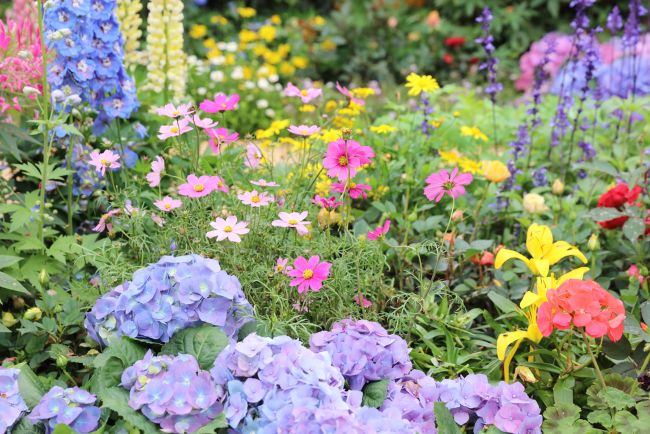Seasonal Planting Tips for a Thriving UK Garden

Gardening enthusiasts in the UK face unpredictable weather and ever-changing soil conditions, yet the joy of a flourishing garden outweighs the effort and patience required. Whether you’re an experienced gardener or just beginning your green-fingered journey, understanding the right tips for each season can make a significant difference. We delve into planting methods tailored to the UK’s unique climate, helping you cultivate a thriving garden throughout the year.
Spring: Awakening Your Garden
Spring heralds renewal and growth, making it the perfect time to start planting. As the ground warms and temperatures rise, focus on hardy plants that can withstand the remnants of winter frost. Early in the season, consider planting bulbs like daffodils, tulips, and crocuses for a burst of colour after winter’s grey months. These vibrant blooms will uplift your spirits and signal the start of the gardening season.
Incorporate staple vegetables such as broad beans, peas, and potatoes into your spring garden. These crops can be sown indoors and later moved outdoors as the weather stabilises. To give your plants a strong start, ensure your soil is well-drained and rich in organic matter. Adding compost or well-rotted manure can enhance soil fertility, providing the essential nutrients your plants need to thrive. If you’re looking for high-quality plants to enrich your garden, check out Jacksons Nurseries today.
As you nurture your garden in spring, prepare for a bountiful summer harvest. Keep an eye on weather forecasts and be ready to cover young plants during unexpected frosts to protect your early efforts. Consider utilising cloches or horticultural fleece to shield sensitive plants from sudden temperature drops. This simple precaution can make a world of difference in maintaining your garden’s health.
Summer: Maintaining Growth and Health
With rising temperatures, your garden will be in full bloom. Summer is a peak growth time, but it also brings challenges such as drought and pests. Regular watering is crucial this season. Watering in the early morning or late evening reduces evaporation, allowing plants to absorb maximum moisture and promoting robust growth.
Mulching is beneficial as it retains soil moisture, suppresses weeds, and keeps roots cool during hot spells. Roses and tomatoes, popular summer plants, thrive with the addition of mulch. Fertilisation is essential too; a balanced fertiliser provides the nutrients needed for vigorous growth. Opt for slow-release fertilisers to support plants throughout the season and reduce the chance of nutrient deficiencies.
Monitor plants for signs of disease or pest infestations to maintain healthy garden conditions. Regularly inspect leaves and stems, as pests often hide in these areas. Use natural predators or organic treatments to manage pests without harming beneficial insects. Introducing ladybirds can be a natural way to control aphid populations, while neem oil can effectively deter many pest species, keeping your garden thriving and safe.
Autumn: Preparing for Rest
As summer gardens wind down, autumn is the time to prepare for winter. Begin by harvesting summer crops and removing dead plant material, which can harbour disease. This transition period is perfect for planting trees and shrubs, as cooler temperatures allow roots to establish without the stress of heat.
Planting spring bulbs is vital in autumn. Tulips, daffodils, and hyacinths should be planted now for beautiful spring blooms. Autumn is also an excellent time to sow green manure, which can be dug into the soil later to improve fertility and structure. Green manures, such as clover or rye, can also help reduce soil erosion during the winter months, thereby safeguarding the integrity of your garden.
Tidy up your garden by cutting back perennials and storing equipment. Preparing your garden in autumn lays a strong foundation for the next growing season. Consider applying a layer of mulch to protect the soil from harsh winter conditions and prevent nutrient loss. This groundwork ensures your garden remains resilient through the colder months.
Winter: Planning and Protection
Winter might seem dormant, but it’s invaluable for planning and protecting your garden. While plants hibernate, focus on maintaining structures and preparing for spring. Check fences, sheds, and tools to ensure they’re ready when the gardening season arrives.
Protection is crucial in winter. Use cloches, fleece, or straw to protect vulnerable plants from extreme temperatures. Move potted plants into greenhouses or position them against sunny, sheltered walls to protect them against frost. It’s also a good time to review your garden’s layout and plan for any changes or expansions. Consider creating a new garden design or researching new plant varieties to incorporate into your garden.
Take this opportunity to explore innovative gardening techniques and refine your gardening skills. Consider topics like crop rotation or companion planting to enhance your garden’s productivity. By doing so, you’ll be ready to implement fresh ideas as soon as spring arrives, armed with new insights and strategies.
Year-Round Considerations
A thriving UK garden requires year-round attention. Soil health is fundamental, so regular soil testing can help determine the nutrient needs of your soil. Composting is a sustainable way to enrich soil and reduce waste, providing natural fertiliser that encourages healthy plant growth. Consider setting up a compost bin or a worm farm to manage kitchen and garden waste easily.
Encourage garden biodiversity by planting native species and providing habitats for wildlife, such as birds, bees, and beneficial insects. This enhances ecological balance and aids in natural pest control. Installing birdhouses or insect hotels can attract beneficial wildlife to your garden, promoting a harmonious environment.
By adopting a holistic approach and remaining attentive to your garden’s changing needs throughout the seasons, you can enjoy a flourishing and sustainable landscape. Embrace the opportunity to connect with nature and transform your space into a haven for both plants and wildlife. A well-tended garden provides joy and serenity, reflecting the effort you invest in cultivating it.


